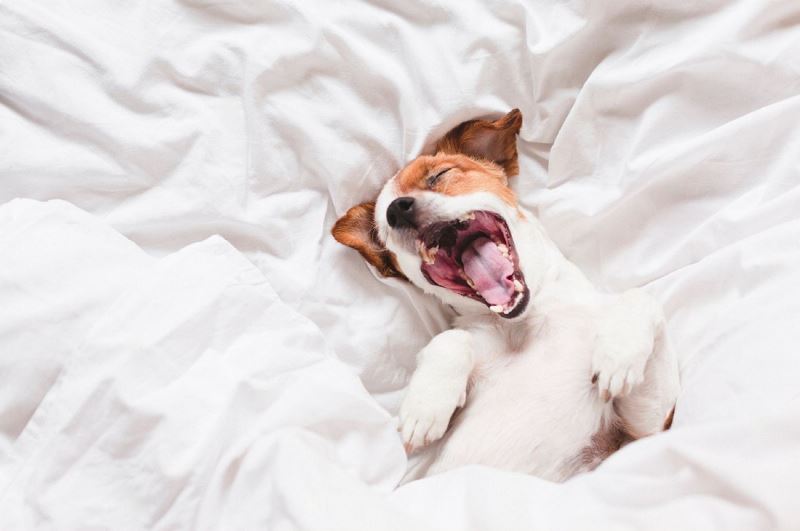Dogs tend to make peculiar noises while they sleep, and it’s not uncommon to hear dogs grunting or snorting as they rest. In most cases, these are perfectly normal sounds, and there’s nothing to worry about.
However, if you hear your dog making loud snoring or grunting noises when sleeping, you may want to take a look at this information to find out why he’s doing this and what you can do about it.
How can you tell if your dog is actually making noises in his sleep or just dreaming?
Before you start wondering if your dog is making noises in his sleep, it’s important to understand how dogs sleep. As a rule of thumb, dogs tend to fall into one of two categories when it comes to sleep: they either rest quietly or become active during their REM cycles.
Restful sleepers will lie still when asleep and will not vocalize; active sleepers, on the other hand, move around quite a bit.
Dogs that fall into the latter category are known for waking up their owners with seemingly random sounds such as grunts, growls or whimpers. If your dog falls into that second category – meaning he makes noises during his REM cycles – it’s likely that what you hear are snores rather than grunts or whimpers.
By listening carefully, you can tell whether your dog is actually making noises in his sleep or just dreaming by comparing them to a familiar sound from home. For example, if you listen closely enough, you might be able to tell whether those grunts are actually snores (which are louder) or small moans (which sound more like whispers).
The same goes for whimpers versus growls; whimpering is softer than growling and usually indicates pain. On top of listening closely, pay attention to how long your dog continues to make noise after falling asleep as well as when he stops. If he starts grunting and then quiets down quickly, chances are he was simply dreaming.
However, if he continues to grunt even after drifting off to sleep, there may be something else going on. In addition, keep an eye out for other symptoms that could indicate health problems such as excessive thirst or increased urination. If your dog seems lethargic or exhibits any unusual behaviour following a night of grunting and whimpering while sleeping, consult your veterinarian immediately.
What are some common causes of grunting while sleeping in dogs?
The causes of grunting in dogs while they sleep range from mild to serious. One of the milder problems that can cause your dog to grunt while sleeping is a stuffy nose, which is not uncommon among small dogs.
While a stuffy nose can be annoying for us, it is even more so for our pets. Dogs use their noses to breathe, so when they have a stuffy nose they may start to grunt as they attempt to draw air in through their nostrils.
Another common problem that can lead to guttural sounds during sleep is an overweight dog or one with some arthritis.
If a dog needs to twist or turn repeatedly while lying on its side or stomach then he may begin making grunting noises out of discomfort.
A dog suffering from heart disease will also often make these types of noises in his sleep. Other diseases that are less common but still possible include kidney disease and liver disease, both of which can make your pet uncomfortable at night.
A less serious cause of grunting could simply be anxiety over being left alone at night or concern over something else going on around him. It’s important to consider all possibilities before assuming you have a medical issue with your pet.
How should I respond if my dog starts grumbling while we’re asleep?
You’ll want to determine what’s causing the noise first before trying anything else.
What can you do to help your dog stop making these noises when he sleeps?
Dogs make a variety of noises while they sleep. Most are nothing to be concerned about, but others can signal problems. If your dog has started making unusual sounds while he sleeps, consults your veterinarian right away.
In most cases, veterinarians will tell you that as long as your dog is eating, drinking and defecating normally—and hasn’t lost interest in playing or other activities he usually enjoys—he’s likely fine.
If your vet does determine there’s a problem with any of these signs, it could be because of a serious condition such as congestive heart failure (CHF).
Dogs with CHF tend to breathe noisily at night, often accompanied by audible grunts or rumbling sounds that sound like snoring. These dogs also might have laboured breathing during exercise or rest.
Your vet may recommend blood work, an echocardiogram or an x-ray if she suspects CHF. Treatment for CHF depends on its severity and may include medication for high blood pressure and antibiotics to help prevent infection in his weakened heart muscle.
It’s important to note that not all grunting during sleep indicates a health problem; many dogs simply grunt when they’re dreaming about chasing rabbits! If your dog seems happy and healthy otherwise, don’t worry too much about those nighttime noises.
